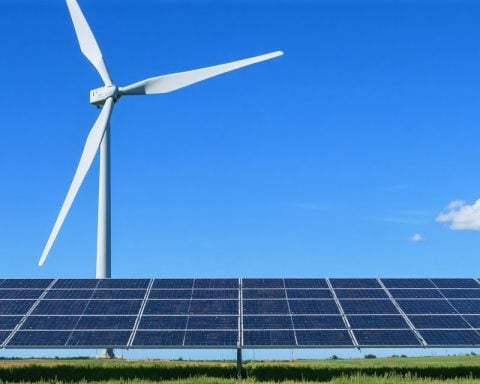In the discourse around sustainable energy, Nigeria firmly anchors its position. Prof. Yemi Osinbajo, the country’s former Vice President, emphasized that gas serves as a crucial transition fuel for Nigeria. Despite rising global opposition to fossil fuels, he argued that leveraging Nigeria’s rich gas resources is essential for industrial growth and a pathway to renewable energy adoption.
During a significant lecture in Lagos, hosted by the Nigerian Conservation Foundation and backed by Chevron, Osinbajo highlighted the urgent need for cohesive action among African nations. A unified approach would empower the continent to influence international climate policy and secure favorable terms for its development agenda.
Osinbajo outlined several recommendations to foster climate-positive growth across Africa. Key among them is strengthening capital markets to attract vital investments into green energy initiatives. He underscored the importance of addressing governance challenges such as transparency and accountability, particularly in public procurement.
The former Vice President also pointed to infrastructure development, particularly climate-resilient structures, as pivotal in supporting industrial activities. He acknowledged existing advancements in green energy, calling for increased cooperation to establish models that benefit all African countries.
To galvanize support for Africa’s climate efforts, Osinbajo urged the global community to fulfill financial commitments, emphasizing the continent’s instrumental role in achieving worldwide carbon neutrality goals.
Nigeria’s Sustainable Energy Agenda: A Path to Collective Prosperity
In the urgent discussions surrounding sustainable energy, Nigeria is positioning itself as a key player, with a vision that intertwines the future of humanity with environmental sustainability and economic growth. Former Vice President Prof. Yemi Osinbajo has been a vocal advocate for utilizing the country’s abundant gas resources as a vital transition fuel—a notion that, while controversial amidst growing global opposition to fossil fuels, raises important questions about the balance between immediate economic needs and long-term environmental sustainability.
One of the critical points raised by Osinbajo during a lecture in Lagos was the necessity for cohesive action among African nations. The current climate crisis demands a collective response, especially from regions like Africa, which are disproportionately affected by climate change yet contribute the least to global emissions. By uniting, these nations can amplify their voice in international climate policy, ensuring that their development plans are respected and supported. This collaboration is not just about survival—it’s about securing a future where Africa can thrive economically and environmentally.
The implications of Osinbajo’s recommendations extend beyond Nigeria. By strengthening capital markets to attract investments in green energy, there lies a significant opportunity to stimulate economic growth while transitioning away from reliance on fossil fuels. This dual approach could set a precedent for developing nations worldwide, suggesting that economic growth does not have to come at the expense of the planet. Instead, it showcases a new model where environmental stewardship and economic development go hand in hand.
Moreover, the focus on governance—promoting transparency and accountability in public procurement—is crucial. Poor governance has often hindered progress in Africa, and addressing these challenges could unlock vast potential. When public funds are utilized effectively, they can help build climate-resilient infrastructure important not just for Nigeria but for other vulnerable nations facing similar risks of climate change.
With rapid advancements in green energy technology, the vision for a sustainable future grows ever closer. But for this vision to materialize, increased cooperation is a must. If African nations can develop collaborative models that embrace green energy and sustainable practices, they can collectively elevate their status on the global stage, influencing international policies while safeguarding their environments.
The plea for the global community to fulfill financial commitments underscores a crucial aspect of the climate challenge: equity. As developing nations strive to meet sustainability goals, the support offered by wealthier countries through funding and technology transfer can make a significant difference. This global partnership is essential not only for achieving carbon neutrality but also for fostering a sustainable future—a future where economic growth is inclusive, and environmental health is prioritized.
In essence, Nigeria’s strategic approach to leveraging its gas resources as a bridge to renewable energy highlights a broader narrative about the future of humanity. It illustrates how nations can take bold steps towards sustainable development, encouraging others to navigate the complexities of energy needs while respecting the planet. As we look ahead, the interconnectedness of environmental policies, economic opportunities, and collaborative governance will define the path humanity takes towards a more sustainable and equitable future.
Unlocking Nigeria’s Sustainable Energy Future: The Role of Gas and Green Investments
Nigeria’s Strategic Position in Sustainable Energy Transition
In the ongoing global dialogue on sustainable energy, Nigeria is reasserting its commitment to balancing energy needs with environmental sustainability. The former Vice President of Nigeria, Prof. Yemi Osinbajo, recently emphasized gas as a pivotal transition fuel, arguing that its exploitation is vital for Nigeria’s industrial growth and a pathway toward adopting renewable energy sources.
Gas as a Transition Fuel
As many nations around the world are advocating for a swift transition from fossil fuels, Osinbajo’s position highlights the unique context of Nigeria. The country possesses vast gas resources that can support a gradual shift to cleaner energy while still meeting the immediate energy demands of its burgeoning population and growing economy. This approach proposes a nuanced strategy where gas is not viewed solely as a fossil fuel but as an essential component in a balanced energy mix.
Recommendations for Climate-Positive Growth
During his address in Lagos, Osinbajo presented critical recommendations aimed at steering Africa towards climate-positive growth:
1. Strengthening Capital Markets
– By enhancing capital markets, Nigeria can attract essential investments towards green energy projects. This is vital for fostering innovation and creating sustainable jobs.
2. Addressing Governance Challenges
– A focus on transparency and accountability in public procurement is necessary to ensure that funds allocated for sustainable projects are used effectively. Improved governance will build investor confidence and encourage more significant contributions to green initiatives.
3. Infrastructure Development
– Building climate-resilient infrastructure is crucial for supporting various industrial activities. The establishment of physical structures that are adaptable to climate change could mitigate risks and enhance economic stability.
4. Cooperation Across African Nations
– Osinbajo called for increased collaboration among African countries to create standardized models for green energy solutions. Such unity can bolster the continent’s negotiating position on international platforms dealing with climate policy and development funds.
The Global Community’s Role
To support Africa’s efforts in combating climate change, Osinbajo stressed the necessity for the global community to meet their financial commitments. Africa plays an instrumental role in global carbon neutrality timelines, and its development must be interconnected with worldwide climate goals.
Market Insights and Trends
The emphasis on gas as a transition fuel presents an opportunity in the market as governments begin to invest in cleaner sources of energy while managing the rising demand. As nations seek sustainable solutions, Nigeria could position itself as a leader in leveraging gas resources, aligning with global trends towards reducing carbon footprints while nurturing economic growth.
Conclusion
As Nigeria navigates the complexities of sustainable energy, the strategic use of gas coupled with robust governance and investment in green infrastructure may well define the continent’s energy transition. The collaborative spirit that Osinbajo advocates not only aims to secure Africa’s interests but also seeks to contribute positively to the world’s ambitious climate agenda.
For more insights into Nigeria’s energy initiatives, you can visit the Nigerian Conservation Foundation.



















